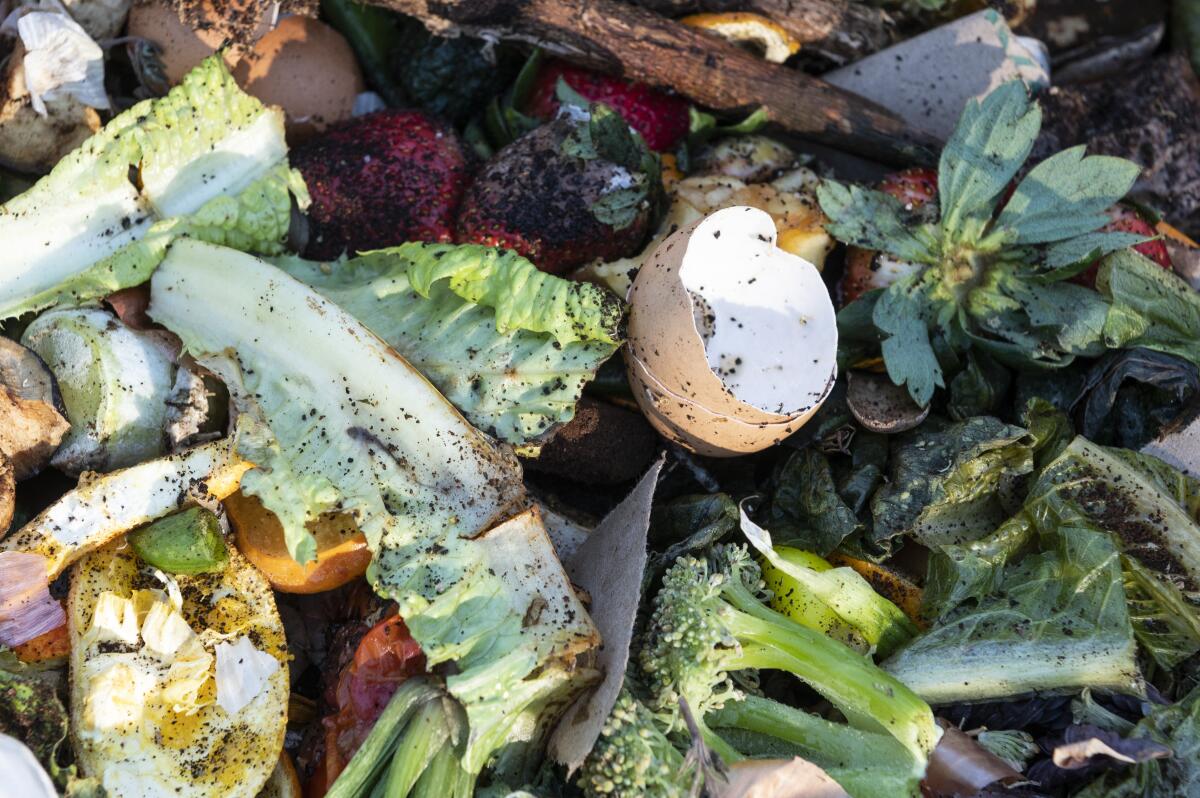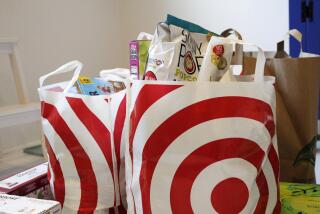L.A. renters need a green bin for compostable garbage. Here’s how to get one

- Share via
By law, all Los Angeles residents must toss their food waste into their homes’ green bins (and yes, that includes pizza boxes!). Nevertheless, some renters are still wondering how they should dispose of their egg shells and banana peels.
As of last year, Californians have been required to separate their food waste from other trash so that it won’t wind up in local landfills — a mandate the state adopted in 2016 (Senate Bill 1383). Lawmakers left it up to local governments to come up with disposal alternatives for compostable material.
The L.A. Bureau of Sanitation announced last month that residents citywide should dispose of food waste and other compostable refuse in their green bins. The city even offered residents a free food waste pail to use in their kitchens.
Many renters in apartment complexes don’t have green bins, however, and were left wondering how they could participate in the program.
The short answer is that their landlords should already be providing them access to a green bin.
Through a program called RecycLA, the city of Los Angeles uses private contractors to collect trash and provide recycling services at apartments and commercial buildings. Those contractors must provide green bins to all their customers, said Dan Meyers, manager of the RecycLA program.
The customers in this scenario are the building owners or property managers, Meyers said. And it’s the landlord’s responsibility to work with the RecycLA waste services provider to establish trash disposal, recycling and food waste service for tenants.
“It is not optional for landlords to participate in the [food waste] program, it is mandatory under state law,” he said.
Building owners who do not already have green bins can request them from their recycling service provider. Or they can contact the L.A. Sanitation Bureau’s 24-hour customer care center at 1-800-773-2489 to request that their service provider do an assessment to establish food waste service.
An assessment would help the service provider determine how much food waste is currently in the trash or blue bins and how much green bin capacity the building would need.
A benefit of this action for the landlord is it could result in a downsizing of the black bins because food waste would now go in the green bin; more recycling would go in the blue bin. It would also decrease their trash disposal bill.
If you are a tenant and your apartment complex doesn’t have a green bin, Meyers said, the city suggests that you ask your landlord or property manager to request bins for the buildings and “remind them that this is mandatory under state law.” It’s also helpful to state in your request that all or a majority of tenants are willing and wanting to participate.
The Bureau of Sanitation recommends tenants work with their building managers to start the service and secure the green bins from the service providers.
“Scheduling the waste assessment and setting up the service may take a little time, but if the building owners remain out of compliance, tenants can call the [sanitation department’s] customer care center to report that,” Meyers said.
Starting in 2024, the law requires local governments to impose fines and penalties to those out of compliance.
According to Meyers, more than 7,000 RecycLA customers, including 2,390 multifamily properties, have been provided green bins and food waste service.
About The Times Utility Journalism Team
This article is from The Times’ Utility Journalism Team. Our mission is to be essential to the lives of Southern Californians by publishing information that solves problems, answers questions and helps with decision making. We serve audiences in and around Los Angeles — including current Times subscribers and diverse communities that haven’t historically had their needs met by our coverage.
How can we be useful to you and your community? Email utility (at) latimes.com or one of our journalists: Jon Healey, Ada Tseng, Jessica Roy and Karen Garcia.
More to Read
Sign up for The Wild
We’ll help you find the best places to hike, bike and run, as well as the perfect silent spots for meditation and yoga.
You may occasionally receive promotional content from the Los Angeles Times.

![Los Angeles, CA - May 19: Carlos Vargas, left, and Paulina Rubio, members of the harm reduction team from Homeless Outreach Program Integrated Care Systems [HOPICS], a leading homeless services and housing agency, look for drug addicts to help and pass out supplies at a homeless RV encampment along 77th St. in South Los Angeles Friday, May 19, 2023. The team hands out syringes, fentanyl test strips, overdose reversal nose spray and medication to prevent overdoses, infection and disease transmission, including the HIV virus. Fenanyl is particularly insidious because it can be found in all other drugs, especially meth and heroin. The handouts are also meant to reduce infection through broken pipes, which can cut users mouths and open them to infection. . (Allen J. Schaben / Los Angeles Times)](https://ca-times.brightspotcdn.com/dims4/default/530e2db/2147483647/strip/true/crop/3900x2608+0+34/resize/320x214!/quality/75/?url=https%3A%2F%2Fcalifornia-times-brightspot.s3.amazonaws.com%2Fe9%2F77%2F4b8bd35d4881a3edec6b945b143b%2F1298639-me-soaring-fentanyl-deaths-24-1-ajs.jpg)









